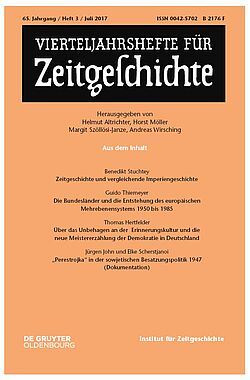Issue 3/2017
Content Overview: English Titles and Abstracts:
- Benedikt Stuchtey: Contemporary History and History of Empires. Turning Points of International Research.
- Guido Thiemeyer: Stepchildren of Integration. The German Federal States and the Emergence of European Multi-Level Governance, 1950 to 1985.
- Thomas Hertfelder: Victims, Perpetrators, Democrats. About the Uneasiness Regarding the Culture of Memory and the New Master Narrative of Democracy in Germany.
- Jürgen John und Elke Scherstjanoi: “Perestrojka” in Soviet Occupation Policy, 1947. Key Documents on the Restructuring of the Military Administration.
Abstracts
Benedikt Stuchtey, Contemporary History and History of Empires. Turning Points of International Research
The article investigates the productive tension between contemporary history and comparative imperial history. The author argues in favour of understanding imperialisms and empires as analytical categories with relevance for contemporary history. He sees good prospects for the writing of the history of colonial empires including their decolonisation as a history of trans-imperial intersections based on the current developments and research results of New Imperial History. Finally he poses the question what was actually “European” in the European Expansion.
Guido Thiemeyer, Stepchildren of Integration. The German Federal States and the Emergence of European Multi-Level Governance, 1950 to 1985
The article provides a historical analysis of the impact of supranational European integration on German federalism based on archival research. When it was set up in 1949, the political system of the Federal Republic of Germany was based on a political equilibrium between the Länder and the Federal Government. With the beginnings of supranational European Integration in the 1950s, when the Federal Government transferred certain elements of national sovereignty to European Organisations, this equilibrium was disturbed. From now on the Länder governments developed different strategies to prevent their creeping disempowerment which went along with this constant change of the political system of the Federal Republic. The article therefore deals with an aspect of “Europeanisation” of the Federal Republic of Germany and the emergence of the so-called European multi-level-governance system.
Thomas Hertfelder, Victims, Perpetrators, Democrats. About the Uneasiness Regarding the Culture of Memory and the New Master Narrative of Democracy in Germany
Since the late 1990s a new master narrative of democracy has formed in Germany. Newer syntheses on the history of the Federal Republic as well as many national exhibition and memorial site projects all follow this narrative. In parallel a debate has flared up regarding the “uneasiness regarding the culture of memory”, which argues that public commemoration of the crimes of the Nazi dictatorship has reached a dead end. Thomas Hertfelder analyses both of these discourses and points out their achievements and fractures: The democracy master narrative is capable of integrating different interpretations of German contemporary history since 1945 and thus also evokes different biographical and generational experiences – admittedly at the price of underexposing moments which can only be integrated into this success narrative with difficulty. Conversely the thesis of the “uneasiness regarding the culture of memory” remains fixated on the Shoah: It rightly emphasises the radical change which public memory of the Nazi dictatorship faces and in this context criticises a stereotypical practice of public remembrance – however on an insufficient empirical basis. The author presents the specifics of the memory of dictatorship and democracy in Germany and argues in favour of combining both perspectives as well as a stronger emphasis on remembrance of democratic lines of tradition despite their ambivalences.
Jürgen John/Elke Scherstjanoi, “Perestrojka” in Soviet Occupation Policy, 1947. Key Documents on the Restructuring of the Military Administration
The largely unknown speech of the chief administrator of SMA (Soviet Military Administration) Thuringia, Ivan S. Kolesničenko (1907–1984), on 10 January 1947 marked the beginning of the transition from a military to a politically organised (albeit militarily secured) occupation regime in the Soviet Zone of Occupation in Germany. The starting point was the realisation in late 1946 that an improved relationship with the German side was necessary for the better implementation of the original goals of the occupation, among them a peace treaty which would be acceptable for all the Allies and the Germans in all four Zones of Occupation. This transition intersected with the changes in policy towards Germany in 1947 – in itself a contentious topic of historiography until today. Kolesničenko’s speech can be seen as a key document for the history of the Soviet Military Administration in Germany (SMAD) and its occupation policy. Between 1945 and 1949 he served as the political head of SMA Thuringia. His initiative was coordinated with the SMAD leadership, which sent copies of the speech to the chief administrators of the other Länder and provinces and thus endued it with the character of an official policy document for the entire zone. The initiative aimed at changed “working styles”, other forms of organisation, an – explicitly so named – “Perestrojka” of principles, methods and structures of occupational rule. At the centre was the restructuring of the network of commanders and the strengthening of political control processes regarding German administrations, Länder governments and Länder parliaments. This was supposed to be based on the principle of “control instead of intervention”. This “Perestrojka”concept contains no strategic change regarding guidelines related to the policy towards Germany, but possessed decisive importance for later occupation practice.

